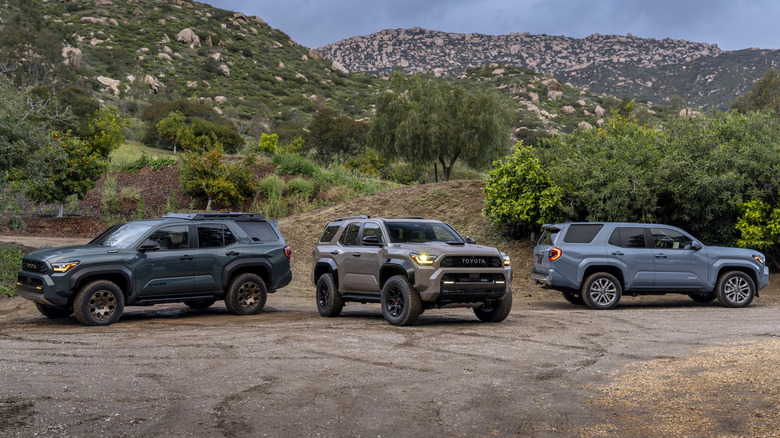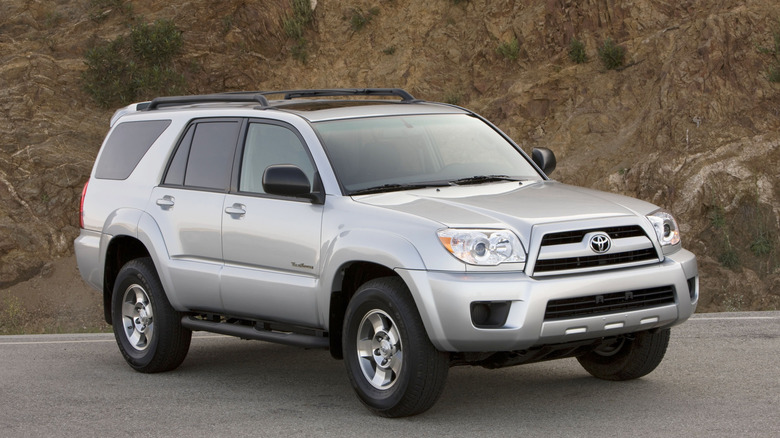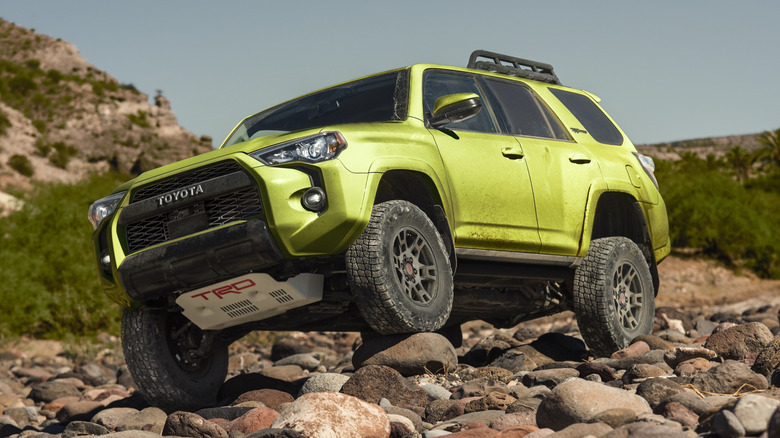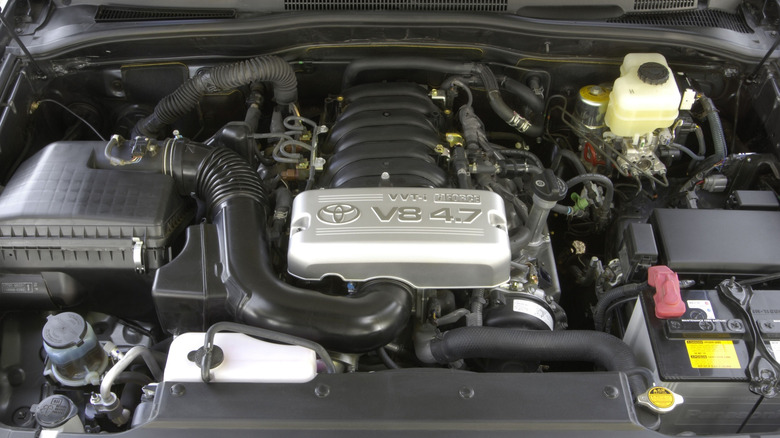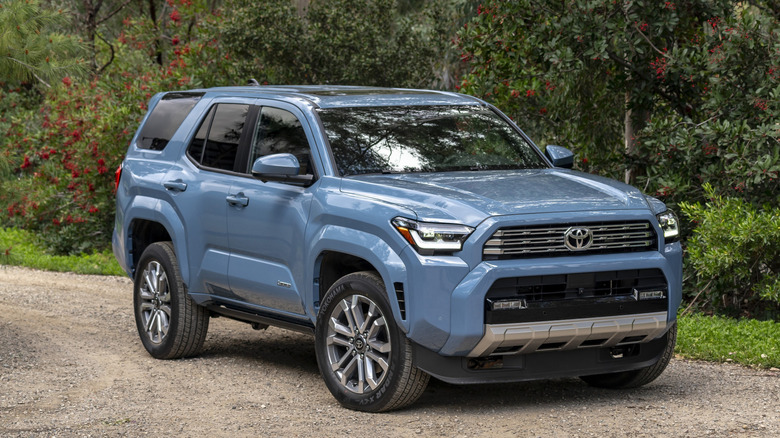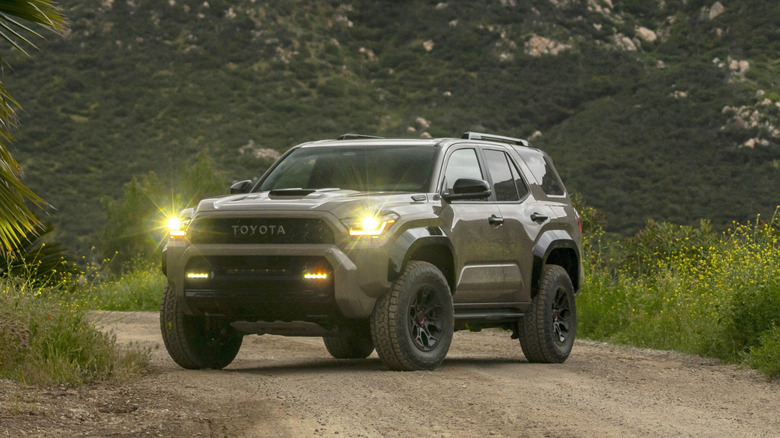5 Of The Most Powerful Engines Ever Put In A Toyota 4Runner
The Toyota 4-Runner is one of the toughest SUVs and in 2025 it got a full redesign with lots of updates, including the powertrain. For five generations, the 4Runner has earned and maintained its reputation as a rugged and reliable SUV, competing with capable rivals like the Jeep Wrangler and Ford Bronco, and now the sixth-generation model will have to carry that torch. The 4Runner has fared well against its competition thanks to robust four-wheel-drive systems, a spacious interior, and a long list of off-road equipment across multiple trim levels — so it'll be a tall task to keep up with modern rivals, but one the off-roader is probably well-prepared for.
Unlike some of its rivals, however, the 4Runner has never really embraced big-power off-roading. The Wrangler has shredded tires and off-road courses alike with its powerful 392 V8, while the Ford Bronco Raptor bounces across the dunes with massive tires and long-travel suspension — and all that time, the 4Runner has soldiered on with relatively modest power. Over the years, most 4Runner models have been characterized by average acceleration, decent horsepower ratings, and modest powerplants — no superlatives here. But just how much power has the 4Runner had over the years? It turns out that there are some respectable engines in the rough-and-tumble Toyota's history.
4th generation 4Runner V6 (2003 – 2009)
During their first few generations, 4Runners were powered by underwhelming engines, at least by today's standards. First-generation models with the inline four-cylinder engine made just 100 horsepower, while V6s that showed up in the late 1980s produced just 150 horses. That small amount of power was sufficient for most daily tasks, but it didn't give the early 4Runner much grunt. That was the way of things for a while, with models as modern as the 2002 4Runner putting out just 183 hp from a 3.4-liter V6.
In 2003, however, the 4Runner was significantly updated and given much more power. Two powertrains were offered in 2003 — the first was a 4.0-liter V6 (called the 1GR-FE) that was paired with a four-speed automatic transmission, and it produced 245 hp and 283 lb-ft of torque at launch. The 4.0-liter V6 would later drop its power ratings slightly to 236 hp and 266 lb-ft of torque, but it was still a big upgrade over the smaller V6 from the past, with smooth acceleration. The second engine offered for this generation was a robust V8 (covered in a later section) which gave the 4Runner a big boost in charisma.
5th generation 4Runner V6 (2010 – 2024)
In 2010, the fifth generation 4Runner launched. A previously-available V8 (more on that in a bit) was eliminated from the lineup that year. A base-model 2.7-liter four-cylinder was launched for better fuel economy, but it was a big step back in terms of power, putting out just 157 hp and 178 lb-ft of torque. Thankfully, the 4.0-liter V6 under the hood was plenty powerful, putting out 270 horsepower and 278 lb-ft of torque. That 4.0-liter V6 would carry on for the next 14 years, all the way up to the 2024 model. Frankly, it's astonishing that the V6 lasted that long, as most cars get refreshed, updated, or completely new engines much faster — generally within seven to 10 years.
When Car and Driver tested the latest 4Runner in 2022, it accelerated from zero to 60 mph in 7.7 seconds. During testing in 2024, a V6-equipped Jeep Wrangler accelerated to 60 mph in 6.1 seconds with a manual transmission and the automatic took 6.8 seconds, while a four-cylinder Wrangler took just 6.5 seconds. The 4Runner's V6 may have been consistent, but it certainly held it back when it came to acceleration.
4th generation 4Runner V8 (2003 – 2009)
On top of the standard V6 available in fourth-generation 4Runners, there was also an available V8. It was the same engine used in both the Toyota Sequoia and Tundra at the time, and it was mighty. The big Toyota powertrain was a 4.7-liter V8 that put out 235 hp and 320 lb-ft of torque. You may have noticed, that's less horsepower than the standard V6 from a few sections back — and you're right. But the V8 got upgraded and would eventually make more power.
By 2005, the V8 powering the 4Runner was putting out 270 hp and 330 lb-ft of torque. That matches the fifth-generation V6 for horsepower, but it's significantly more torque, so it's enough to give it a higher spot on our list. During a Car and Driver test, the V6-powered 2005 4Runner accelerated from zero to 60 mph in a respectable 7.2 seconds.
When Car and Driver tested the V8-powered 4Runner back in 2003 (when it made 235 hp and 320 lb-ft of torque) it accelerated from zero to 60 mph in 8.0 seconds — the slower acceleration was likely a result of the truck's added weight. It wasn't what you'd call fast, but much better than the previous-generation 4Runner, which took 10 seconds to reach the same speed.
6th generation 4Runner i-FORCE four-cylinder (2025)
Redesigning the 4Runner is a big task. It needs to be properly equipped for off-road enthusiasts and capable enough to reach any off-road destination, but also comfortable and modern enough to compete with a long list of SUVs from rival brands. While we don't know what the newest 4Runner is like to drive yet, we do know that it has a number of different trim levels to choose from and a pair of powertrains that will likely be up to the task.
The standard powertrain for the new 2025 4Runner is a turbocharged 2.4-liter four-cylinder engine that produces 278 horsepower and 317 lb-ft of torque. That's more horsepower than any 4Runner before it, and we haven't even gotten to the optional powertrain yet. The four-cylinder engine, called the i-FORCE by Toyota, is also found in the newest Tacoma – its midsize pickup truck. In the Tacoma, the i-FORCE engine propelled the pickup from zero to 60 mph in 7.0 seconds — a respectable time and similar to what we expect the 4Runner will be able to do.
6th generation 4Runner i-FORCE MAX hybrid four-cylinder (2025)
The most powerful powertrain ever put under the hood of a 4Runner is a hybrid. The newly optional powertrain for 2025, called the i-FORCE MAX, makes 326 hp and a whopping 465 lb-ft of torque — nearly 150 more lb-ft than the standard model. The i-FORCE MAX also uses a 2.4-liter four-cylinder engine, but it's paired with a 48-horsepower electric motor for extra gusto. The hybrid powertrain will be available on some mid-level trims and standard on upper trims, abd while there's lots of new tech to like in the 2025 4Runner, the powertain it might not give us the extra performance we're hoping for.
During acceleration tests of the hybrid-powered Toyota Tacoma, Car and Driver found it to be slower than the standard model, accelerating from zero to 60 mph in 7.7 seconds. Fuel economy estimates aren't out for the 4Runner yet, so it's hard to say if the hybrid powertrain will make a case for itself in the mpg department. For power-hungry off-roaders, especially those craving a V6 or a V8, it may be disappointing despite it's big power and torque numbers.
